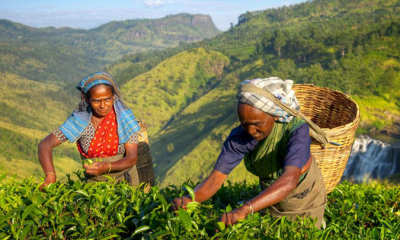Features
Worsening crisis gives rise to birthing of new nation
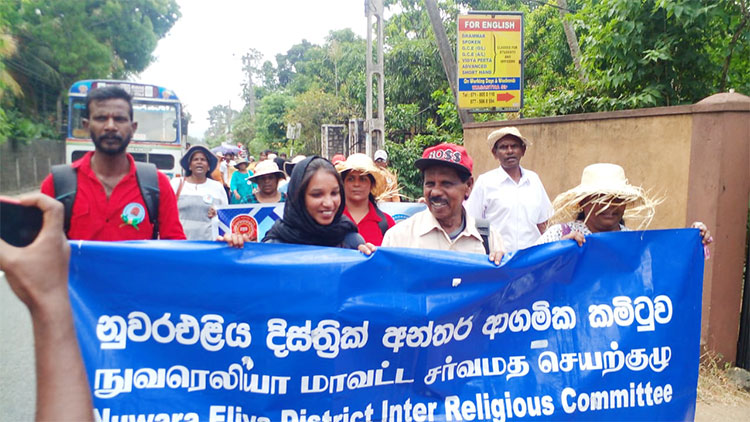
by Jehan Perera
A little publicised march wended its way from Talaimannar in the north-west coast to Matale in the central hills. The march retraced the jungle track of 200 years ago that brought a flow of men and women in the tens of thousands from the south of India to work on the newly established tea plantations of Sri Lanka. The symbolic reenactment of that journey took place over the past fortnight. But only a handful could cope with the rigours of the long march and kept going from Talaimannar to Matale. Tens of thousands had perished in the previous centuries, along the way. In some groups, as many as 40 percent died along the way. Those who trod the same route in the modern era were mindful that the ground they walked upon contained the graves of missing people of another era. The hundreds who joined the march at various points along the trail had all the modern amenities of paved roads, shops and eating places on the roadside and hygienic facilities to sleep and refresh themselves. They were treated with tolerance by most and with empathy by many.
The current economic crisis has most severely affected the people who continue to work on the plantations in support of whom the march took place. Their struggle for a paltry wage of Rs 1,000 per day commenced before the Covid pandemic weakened the national economy. However, the work on tea plantations continued as the government curfews that sought to restrict the spread of the virus was not applied to the agricultural sector. When the plantation workers finally got the Rs 1,000 per day wage in 2021 after more than five years of struggle its real value was devalued by inflation. In addition, various conditions were attached to it, such as working for a minimum number of days and plucking a minimum number of kilos of tea in order to get the full amount. The position of the plantation companies is that they cannot run their enterprises profitably except by imposing such conditions and keeping wages low.
The colonial system of bonded labour that kept them separate from the mainstream in the country and which made the estate administration their overlord needs to be completely dismantled and modern forms of ownership and production need to be brought in. Today, the Rs 1,000 wage that the plantation workers fought for so long has become the equivalent of Rs 500 per day which is clearly impossible to live on regardless of the number from a family who work on the plantations. This is borne out by World Bank surveys that show the plantation sector to be the most badly affected one in the country with a poverty level reaching 50 percent of the population. In this desperate situation it is not surprising that few of them could take a leave of absence from their work to join the march and forego the Rs 1,000 per day that requires working a minimum number of days. Many of those who symbolically represented the plantation community on the two weeks long trek came from civil society organisations.
ACCOUNTABILTY ALLROUND
The National Christian Council together with several civil society organisations supported the initiative which went under the name of Collective for Maanbumigu Malaiyaha Makkal. The statement issued by the collective had this to say. “The demands articulated by the Malaiyaha Tamil people since independence have included their recognition as full fledged citizens on par with Sri Lanka’s other communities. The demands have consistently been for equality, non-discrimination, security and political and administrative arrangements that safeguard the interests and identity of the community. These demands were made so that the community would have the requisite voice and power to lie with dignity, self respect, peace and security and manage the affairs of its people who live in a concentrated manner in the Nuwara Eliya district and in a dispersed manner in several other parts of Sri Lanka.”
“The current status of the Malaiyaha Tamil community, including over 500,000 living in plantations as residents, has been a result of a history of involuntary expatriation, imposed statelessness, uncertainty around citizenship and a lack of franchise. This has impacted on the community’s socio-economic well being. The most affected segment has been those living and working in the plantation estates. They have become the most marginalised group in the country, registering lower measures on almost all human development indices, compared to every other community in the country. This has seriously impaired their transition from workers tied to, and dependent on their plantation employers to full fledged citizens of Sri Lanka, with equal rights as others.
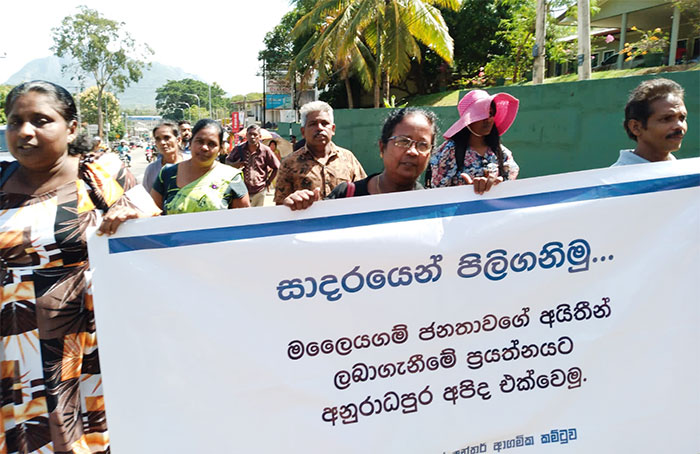
Apura Malaiyaha
The national anthem refers to those who inhabit the land as children of one mother. The words of the national anthem are so much valued that even the inadvertent mispronunciation of its words are liable to draw a furious response and demand for punishment. However, the spirit of the national anthem was violated at the birth of the country as an independent nation. One of its children was cast out of paradise. The much acclaimed free education policy of Kannangara did not include children of poor plantation workers. Their education was left in the hands of the estate management until 1980, following joint trade union action the government was compelled to grant opportunities for their education. Unfortunately, opportunities for quality education are still lacking in comparison to schools elsewhere. There are religious teachings of people being cast out of paradise for committing sin. However, the Tamil people who worked on the plantations had committed no sin. Instead, by their toil on the plantations they had succeeded in making the country one of the most prosperous in Asia at the time of independence and able to support free education. The departing British likened the country to being the Switzerland of the East. They too need to be held accountable for failing to live up to the values they upheld and continue to uphold.
JUSTIFIED REPARATIONS
In 1948, in one of its first decisions, the government of independent Sri Lanka denied the Tamils of recent Indian origin the right to live in the country as citizens. At that time, they were the largest ethnic minority population in the country, exceeding the Sri Lanka Tamil population. Tragically, virtually all sections of the Sri Lankan nation were complicit in a cruel decision that stripped over a million people of their right to citizenship and with their right to vote and other basic human rights. The constitution did not provide them with protection nor did the rule of law. Even the acclaimed British system of justice failed them, as the Privy Council in London, which was the last court of appeal under the then prevailing Soulbury Constitution failed to apply the law justly. The Privy Council acquiesced in the verdict of the Sri Lankan supreme court at that time, and glossed over and denied the applicability of Section 29 of the constitution which laid down that no community could be subjected to any disability that was not similarly applied to the others. According to international law, the accountability for crimes against humanity is universal and knows no national boundaries.
In their statement the Collective for Maanbumigu Malaiyaha Makkal made several demands. These included the acknowledgement of their history, struggle and contribution, and recognition of the community as a constituent people of post-independent Sri Lanka with a distinct identity on par with the other main communities. In the context of the present realities this means affirmative action on education, health and social security to ensure parity with the national average, power sharing that would give them a meaningful role in governance at all tiers of government and reparations in some form or the other. In Naula, during one of the many wayside discussions on the road to Matale, this shift in thinking to that of a community entitled to justice, reparations and a share of decision-making power became evident. Those who spoke on behalf of the Malaiyaha Tamils affirmed the point that what they needed was not sympathy or assistance, but an assertion of their rights as equal citizens in which benefits extended to one community should not be withheld from another.
One of the government’s recent proposals has been to establish a National Unity and Reconciliation Commission (truth commission) for which the draft legislation has already been prepared. The mandate of this truth commission is overly narrow, covering only a part of the war that the country experienced during the period 1983 to 2009. The country needs a larger reckoning with the truth if it is to overcome the past and forge ahead in unity. The disenfranchisement and denial of citizenship rights to the Malaiyaha Tamils set the stage for governance without accountability that has finally brought the country to the sorry situation it is currently in. The broader truth commission needs to include the trail of death from Talaimannar to Matale, the virtual imprisonment of a vast population as indentured labour for over 200 years, the denial of their citizenship rights 75 years ago and the need for accountability, reparations and institutional reforms to rectify the wrongs of the past, including the colonial period.
Features
Following the Money: Tourism’s revenue crisis behind the arrival numbers – PART II
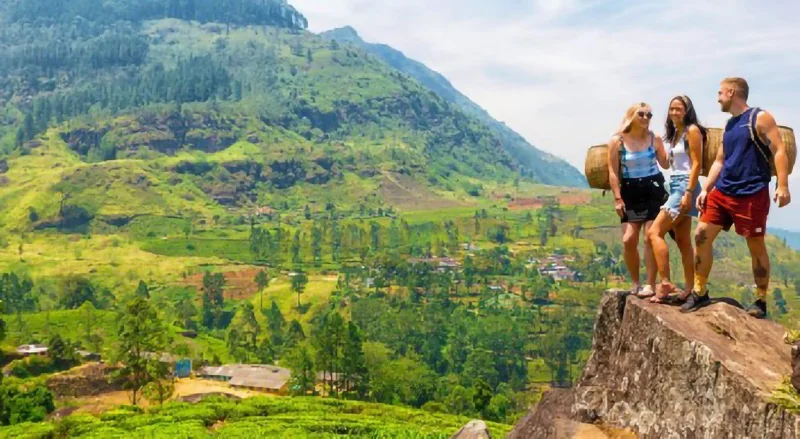
(Article 2 of the 4-part series on Sri Lanka’s tourism stagnation)
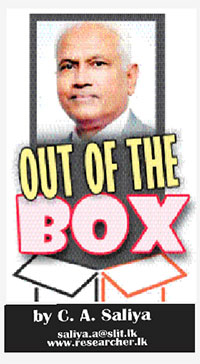 If Sri Lanka’s tourism story were a corporate income statement, the top line would satisfy any minister. Arrivals went up 15.1%, targets met, records broke. But walk down the statement and the story darkens. Revenue barely budges. Per-visitor yield collapses. The money that should accompany all those arrivals has quietly vanished, or, more accurately, never materialised.
If Sri Lanka’s tourism story were a corporate income statement, the top line would satisfy any minister. Arrivals went up 15.1%, targets met, records broke. But walk down the statement and the story darkens. Revenue barely budges. Per-visitor yield collapses. The money that should accompany all those arrivals has quietly vanished, or, more accurately, never materialised.
This is not a recovery. It is a volume trap, more tourists generating less wealth, with policymakers either oblivious to the math or unwilling to confront it.
Problem Diagnosis: The Paradox of Plenty:
The numbers tell a brutal story.
Read that again: arrivals grew 15.1% year-on-year, but revenue grew only 1.6%. The average tourist in 2025 left behind $181 less than in 2024, an 11.7% decline. Compared to 2018, the drop is even sharper. In real terms, adjusting for inflation and currency depreciation, each visitor in 2025 generates approximately 27-30% less revenue than in 2018, despite Sri Lanka being “cheaper” due to the rupee’s collapse. This is not marginal variance. This is structural value destruction. (See Table 1)

The math is simple and damning: Sri Lanka is working harder for less. More tourists, lower yield, thinner margins. Why? Because we have confused accessibility with competitiveness. We have made ourselves “affordable” through currency collapse and discounting, not through value creation.
Root Causes: The Five Mechanisms of Value Destruction
The yield collapse is not random. It is the predictable outcome of specific policy failures and market dynamics.
1. Currency Depreciation as False Competitiveness
The rupee’s collapse post-2022 has made Sri Lanka appear “cheap” to foreigners. A hotel room priced at $100 in 2018 might cost $70-80 in effective purchasing power today due to depreciation. Tour operators have aggressively discounted to fill capacity during the crisis recovery.
This creates the illusion of competitiveness. Arrivals rise because we are a “bargain.” But the bargain is paid for by domestic suppliers, hotels, transport providers, restaurants, staff, whose input costs (energy, food, imported goods) have skyrocketed in rupee terms while room rates lag in dollar terms.
The transfer is explicit: value flows from Sri Lankan workers and businesses to foreign tourists. The tourism “recovery” extracts wealth from the domestic economy rather than injecting it.
2. Market Composition Shift: Trading European Yields for Asian Volumes
SLTDA data shows a deliberate (or accidental—the policy opacity makes it unclear) shift in source markets. (See Table 2)

The problem is not that we attract Indians or Russians, it is that we attract them without strategies to optimise their yield. As the next article in this series will detail, Indian tourists average approximately 5.27 nights compared to the 8-9 night overall average, with lower per-day spending. We have built recovery on volume from price-sensitive segments rather than value from high-yield segments.
This is a choice, though it appears no one consciously made it. Visa-free entry, aggressive India-focused marketing, and price positioning have tilted the market mix without any apparent analysis of revenue implications.
3. Length of Stay Decline and Activity Compression
Average length of stay has compressed. While overall averages hover around 8-9 nights in recent years, the composition matters. High-yield European and North American tourists who historically spent 10-12 nights are now spending 7-9. Indian tourists spend 5-6 nights.
Shorter stays mean less cumulative spending, fewer experiences consumed, less distribution of value across the tourism chain. A 10-night tourist patronises multiple regions, hotels, guides, restaurants. A 5-night tourist concentrates spending in 2-3 locations, typically Colombo, one beach, one cultural site.
The compression is driven partly by global travel trends (shorter, more frequent trips) but also by Sri Lanka’s failure to develop compelling multi-day itineraries, adequate inter-regional connectivity, and differentiated regional experiences. We have not given tourists reasons to stay longer.
4. Infrastructure Decay and Experience Degradation
Tourists pay for experiences, not arrivals. When experiences degrade, airport congestion, poor road conditions, inadequate facilities at cultural sites, safety concerns, spending falls even if arrivals hold.
The 2024-2025 congestion at Bandaranaike International Airport, with reports of tourists nearly missing flights due to bottlenecks, is the visible tip. Beneath are systemic deficits: poor last-mile connectivity to tourism sites, deteriorating heritage assets, unregistered businesses providing sub-standard services, outbound migration of trained staff.
An ADB report notes that tourism authorities face resource shortages and capital expenditure embargoes, preventing even basic facility improvements at major revenue generators like Sigiriya (which charges $36 per visitor and attracts 25% of all tourists). When a site generates substantial revenue but lacks adequate lighting, safety measures, and visitor facilities, the experience suffers, and so does yield.
5. Leakage: The Silent Revenue Drain
Tourism revenue figures are gross. Net foreign exchange contributions after leakages, is rarely calculated or published.
Leakages include:
· Imported food, beverages, amenities in hotels (often 30-40% of operating costs)
· Foreign ownership and profit repatriation
· International tour operators taking commissions upstream (tourists book through foreign platforms that retain substantial margins)
· Unlicensed operators and unregulated businesses evading taxes and formal banking channels
Industry sources estimate leakages can consume 40-60% of gross tourism revenue in developing economies with weak regulatory enforcement. Sri Lanka has not published comprehensive leakage studies, but all indicators, weak licensing enforcement, widespread informal sector activity, foreign ownership concentration in resorts, suggest leakages are substantial and growing.
The result: even the $3.22 billion headline figure overstates actual net contribution to the economy.
The Way Forward: From Volume to Value
Reversing the yield collapse requires
systematic policy reorientation, from arrivals-chasing to value-building.
First
, publish and track yield metrics as primary KPIs. SLTDA should report:
· Revenue per visitor (by source market, by season, by purpose)
· Average daily expenditure (disaggregated by accommodation, activities, food, retail)
· Net foreign exchange contribution after documented leakages
· Revenue per room night (adjusted for real exchange rates)
Make these as visible as arrival numbers. Hold policy-makers accountable for yield, not just volume.
Second
, segment markets explicitly by yield potential. Stop treating all arrivals as equivalent. Conduct market-specific yield analyses:
· Which markets spend most per day?
· Which stays longest?
· Which distributes spending across regions vs. concentrating in Colombo/beach corridors?
· Which book is through formal channels vs. informal operators?
Target marketing and visa policies accordingly. If Western European tourists spend $250/day for 10 nights while another segment spends $120/day for 5 nights, the revenue difference ($2,500 vs. $600) dictates where promotional resources should flow.
Third
, develop multi-day, multi-region itineraries with compelling value propositions. Tourists extend stays when there are reasons to stay. Create integrated experiences:
· Cultural triangle + beach + hill country circuits with seamless connectivity
· Themed tours (wildlife, wellness, culinary, adventure) requiring 10+ days
· Regional spread of accommodation and experiences to distribute economic benefits
This requires infrastructure investment, precisely what has been neglected.
Fourth
, regulations to minimise leakages. Enforce licensing for tourism businesses. Channel bookings through formal operators registered with commercial banks. Tax holiday schemes should prioritise investments that maximise local value retention, staff training, local sourcing, domestic ownership.
Fifth
, stop using currency depreciation as a competitive strategy. A weak rupee makes Sri Lanka “affordable” but destroys margins and transfers wealth outward. Real competitiveness comes from differentiated experiences, quality standards, and strategic positioning, not from being the “cheapest” option.
The Hard Math: What We’re Losing
Let’s make the cost explicit. If Sri Lanka maintained 2018 per-visitor spending levels ($1,877) on 2025 arrivals (2.36 million), revenue would be approximately $4.43 billion, not $3.22 billion. The difference: $1.21 billion in lost revenue, value that should have been generated but wasn’t.
That $1.21 billion is not a theoretical gap. It represents:
· Wages not paid
· Businesses not sustained
· Taxes not collected
· Infrastructure not funded
· Development not achieved
This is the cost of volume-chasing without yield discipline. Every year we continue this model; we lock in value destruction.
The Policy Failure: Why Arrivals Theater Persists
Why do policymakers fixate on arrivals when revenue tells the real story?
Because arrivals are politically legible. A minister can tout “record tourist numbers” in a press conference. Revenue per visitor requires explanation, context, and uncomfortable questions about policy choices.
Arrivals are easy to manipulate upward, visa-free entry, aggressive discounting, currency depreciation. Yield is hard, it requires product development, market curation, infrastructure investment, regulatory enforcement.
Arrivals theater is cheaper and quicker than strategic transformation. But this is governance failure at its most fundamental. Tourism’s contribution to economic recovery is not determined by how many planes land but by how much wealth each visitor creates and retains domestically. Every dollar spent celebrating arrival records while ignoring yield collapse is a waste of dollars.
The Uncomfortable Truth
Sri Lanka’s tourism “boom” is real in volume, but it is a value bust. We are attracting more tourists and generating less wealth. The industry is working harder for lower returns. Margins are compressed, staff are paid less in real terms, infrastructure decays, and the net contribution to national recovery underperforms potential.
This is not sustainable. Eventually, operators will exit. Quality will degrade further. The “affordable” positioning will shift to “cheap and deteriorating.” The volume will follow yield down.
We have two choices: acknowledge the yield crisis and reorient policy toward value creation or continue arrivals theater until the hollowness becomes undeniable.
The money has spoken. The question is whether anyone in power is listening.
Features
Misinterpreting President Dissanayake on National Reconciliation
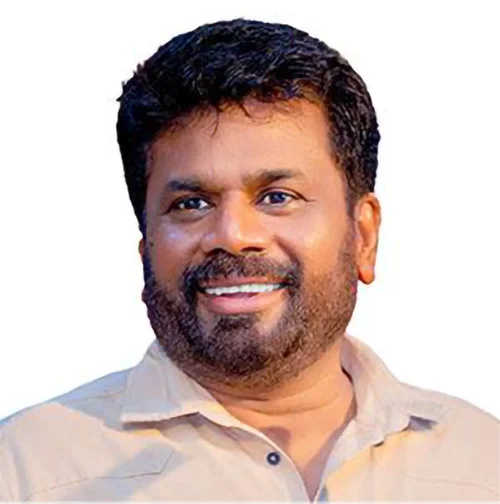
President Anura Kumara Dissanayake has been investing his political capital in going to the public to explain some of the most politically sensitive and controversial issues. At a time when easier political choices are available, the president is choosing the harder path of confronting ethnic suspicion and communal fears. There are three issues in particular on which the president’s words have generated strong reactions. These are first with regard to Buddhist pilgrims going to the north of the country with nationalist motivations. Second is the controversy relating to the expansion of the Tissa Raja Maha Viharaya, a recently constructed Buddhist temple in Kankesanturai which has become a flashpoint between local Tamil residents and Sinhala nationalist groups. Third is the decision not to give the war victory a central place in the Independence Day celebrations.
Even in the opposition, when his party held only three seats in parliament, Anura Kumara Dissanayake took his role as a public educator seriously. He used to deliver lengthy, well researched and easily digestible speeches in parliament. He continues this practice as president. It can be seen that his statements are primarily meant to elevate the thinking of the people and not to win votes the easy way. The easy way to win votes whether in Sri Lanka or elsewhere in the world is to rouse nationalist and racist sentiments and ride that wave. Sri Lanka’s post independence political history shows that narrow ethnic mobilisation has often produced short term electoral gains but long term national damage.
Sections of the opposition and segments of the general public have been critical of the president for taking these positions. They have claimed that the president is taking these positions in order to obtain more Tamil votes or to appease minority communities. The same may be said in reverse of those others who take contrary positions that they seek the Sinhala votes. These political actors who thrive on nationalist mobilisation have attempted to portray the president’s statements as an abandonment of the majority community. The president’s actions need to be understood within the larger framework of national reconciliation and long term national stability.
Reconciler’s Duty
When the president referred to Buddhist pilgrims from the south going to the north, he was not speaking about pilgrims visiting long established Buddhist heritage sites such as Nagadeepa or Kandarodai. His remarks were directed at a specific and highly contentious development, the recently built Buddhist temple in Kankesanturai and those built elsewhere in the recent past in the north and east. The temple in Kankesanturai did not emerge from the religious needs of a local Buddhist community as there is none in that area. It has been constructed on land that was formerly owned and used by Tamil civilians and which came under military occupation as a high security zone. What has made the issue of the temple particularly controversial is that it was established with the support of the security forces.
The controversy has deepened because the temple authorities have sought to expand the site from approximately one acre to nearly fourteen acres on the basis that there was a historic Buddhist temple in that area up to the colonial period. However, the Tamil residents of the area fear that expansion would further displace surrounding residents and consolidate a permanent Buddhist religious presence in the present period in an area where the local population is overwhelmingly Hindu. For many Tamils in Kankesanturai, the issue is not Buddhism as a religion but the use of religion as a vehicle for territorial assertion and demographic changes in a region that bore the brunt of the war. Likewise, there are other parts of the north and east where other temples or places of worship have been established by the military personnel in their camps during their war-time occupation and questions arise regarding the future when these camps are finally closed.
There are those who have actively organised large scale pilgrimages from the south to make the Tissa temple another important religious site. These pilgrimages are framed publicly as acts of devotion but are widely perceived locally as demonstrations of dominance. Each such visit heightens tension, provokes protest by Tamil residents, and risks confrontation. For communities that experienced mass displacement, military occupation and land loss, the symbolism of a state backed religious structure on contested land with the backing of the security forces is impossible to separate from memories of war and destruction. A president committed to reconciliation cannot remain silent in the face of such provocations, however uncomfortable it may be to challenge sections of the majority community.
High-minded leadership
The controversy regarding the president’s Independence Day speech has also generated strong debate. In that speech the president did not refer to the military victory over the LTTE and also did not use the term “war heroes” to describe soldiers. For many Sinhala nationalist groups, the absence of these references was seen as an attempt to diminish the sacrifices of the armed forces. The reality is that Independence Day means very different things to different communities. In the north and east the same day is marked by protest events and mourning and as a “Black Day”, symbolising the consolidation of a state they continue to experience as excluding them and not empathizing with the full extent of their losses.
By way of contrast, the president’s objective was to ensure that Independence Day could be observed as a day that belonged to all communities in the country. It is not correct to assume that the president takes these positions in order to appease minorities or secure electoral advantage. The president is only one year into his term and does not need to take politically risky positions for short term electoral gains. Indeed, the positions he has taken involve confronting powerful nationalist political forces that can mobilise significant opposition. He risks losing majority support for his statements. This itself indicates that the motivation is not electoral calculation.
President Dissanayake has recognized that Sri Lanka’s long term political stability and economic recovery depend on building trust among communities that once peacefully coexisted and then lived through decades of war. Political leadership is ultimately tested by the willingness to say what is necessary rather than what is politically expedient. The president’s recent interventions demonstrate rare national leadership and constitute an attempt to shift public discourse away from ethnic triumphalism and toward a more inclusive conception of nationhood. Reconciliation cannot take root if national ceremonies reinforce the perception of victory for one community and defeat for another especially in an internal conflict.
BY Jehan Perera
Features
Recovery of LTTE weapons
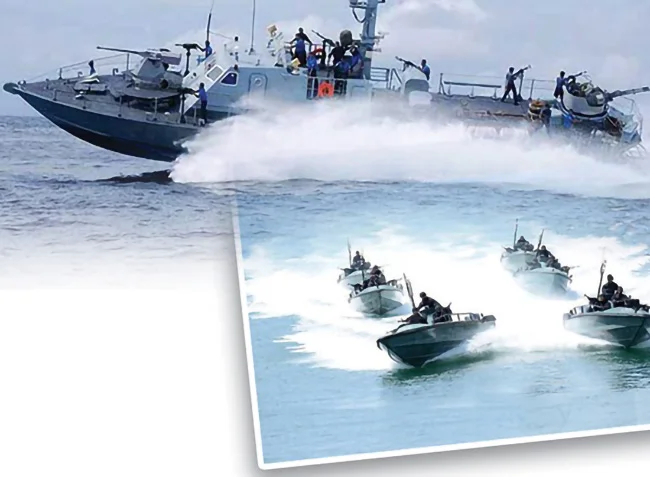
I have read a newspaper report that the Special Task Force of Sri Lanka Police, with help of Military Intelligence, recovered three buried yet well-preserved 84mm Carl Gustaf recoilless rocket launchers used by the LTTE, in the Kudumbimalai area, Batticaloa.
These deadly weapons were used by the LTTE SEA TIGER WING to attack the Sri Lanka Navy ships and craft in 1990s. The first incident was in February 1997, off Iranativu island, in the Gulf of Mannar.
Admiral Cecil Tissera took over as Commander of the Navy on 27 January, 1997, from Admiral Mohan Samarasekara.
The fight against the LTTE was intensified from 1996 and the SLN was using her Vanguard of the Navy, Fast Attack Craft Squadron, to destroy the LTTE’s littoral fighting capabilities. Frequent confrontations against the LTTE Sea Tiger boats were reported off Mullaitivu, Point Pedro and Velvetiturai areas, where SLN units became victorious in most of these sea battles, except in a few incidents where the SLN lost Fast Attack Craft.

Carl Gustaf recoilless rocket launchers
The intelligence reports confirmed that the LTTE Sea Tigers was using new recoilless rocket launchers against aluminium-hull FACs, and they were deadly at close quarter sea battles, but the exact type of this weapon was not disclosed.
The following incident, which occurred in February 1997, helped confirm the weapon was Carl Gustaf 84 mm Recoilless gun!
DATE: 09TH FEBRUARY, 1997, morning 0600 hrs.
LOCATION: OFF IRANATHIVE.
FACs: P 460 ISRAEL BUILT, COMMANDED BY CDR MANOJ JAYESOORIYA
P 452 CDL BUILT, COMMANDED BY LCDR PM WICKRAMASINGHE (ON TEMPORARY COMMAND. PROPER OIC LCDR N HEENATIGALA)
OPERATED FROM KKS.
CONFRONTED WITH LTTE ATTACK CRAFT POWERED WITH FOUR 250 HP OUT BOARD MOTORS.
TARGET WAS DESTROYED AND ONE LTTE MEMBER WAS CAPTURED.
LEADING MARINE ENGINEERING MECHANIC OF THE FAC CAME UP TO THE BRIDGE CARRYING A PROJECTILE WHICH WAS FIRED BY THE LTTE BOAT, DURING CONFRONTATION, WHICH PENETRATED THROUGH THE FAC’s HULL, AND ENTERED THE OICs CABIN (BETWEEN THE TWO BUNKS) AND HIT THE AUXILIARY ENGINE ROOM DOOR AND HAD FALLEN DOWN WITHOUT EXPLODING. THE ENGINE ROOM DOOR WAS HEAVILY DAMAGED LOOSING THE WATER TIGHT INTEGRITY OF THE FAC.
THE PROJECTILE WAS LATER HANDED OVER TO THE NAVAL WEAPONS EXPERTS WHEN THE FACs RETURNED TO KKS. INVESTIGATIONS REVEALED THE WEAPON USED BY THE ENEMY WAS 84 mm CARL GUSTAF SHOULDER-FIRED RECOILLESS GUN AND THIS PROJECTILE WAS AN ILLUMINATER BOMB OF ONE MILLION CANDLE POWER. BUT THE ATTACKERS HAS FAILED TO REMOVE THE SAFETY PIN, THEREFORE THE BOMB WAS NOT ACTIVATED.
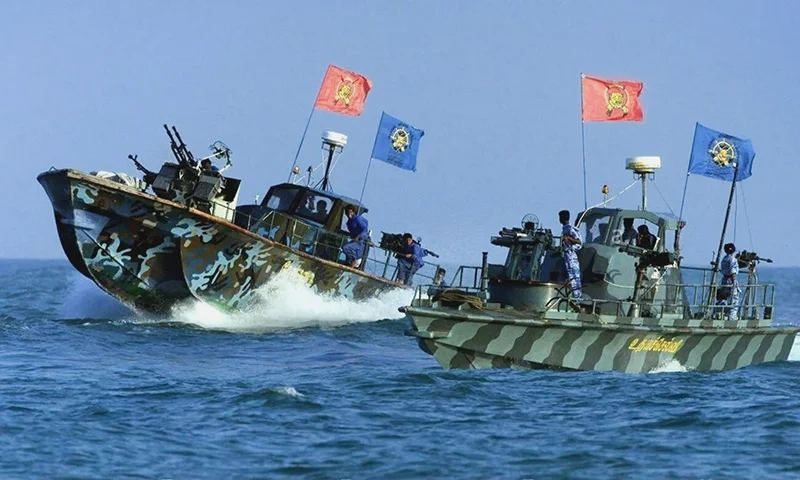
Sea Tigers
Carl Gustaf 84 mm recoilless gun was named after Carl Gustaf Stads Gevärsfaktori, which, initially, produced it. Sweden later developed the 84mm shoulder-fired recoilless gun by the Royal Swedish Army Materiel Administration during the second half of 1940s as a crew served man- portable infantry support gun for close range multi-role anti-armour, anti-personnel, battle field illumination, smoke screening and marking fire.
It is confirmed in Wikipedia that Carl Gustaf Recoilless shoulder-fired guns were used by the only non-state actor in the world – the LTTE – during the final Eelam War.
It is extremely important to check the batch numbers of the recently recovered three launchers to find out where they were produced and other details like how they ended up in Batticaloa, Sri Lanka?
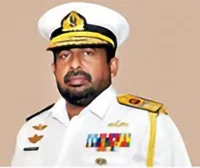 By Admiral Ravindra C. Wijegunaratne
By Admiral Ravindra C. Wijegunaratne
WV, RWP and Bar, RSP, VSV, USP, NI (M) (Pakistan), ndc, psn, Bsc (Hons) (War Studies) (Karachi) MPhil (Madras)
Former Navy Commander and Former Chief of Defence Staff
Former Chairman, Trincomalee Petroleum Terminals Ltd
Former Managing Director Ceylon Petroleum Corporation
Former High Commissioner to Pakistan
-

 Features4 days ago
Features4 days agoMy experience in turning around the Merchant Bank of Sri Lanka (MBSL) – Episode 3
-

 Business5 days ago
Business5 days agoZone24x7 enters 2026 with strong momentum, reinforcing its role as an enterprise AI and automation partner
-

 Business4 days ago
Business4 days agoRemotely conducted Business Forum in Paris attracts reputed French companies
-

 Business4 days ago
Business4 days agoFour runs, a thousand dreams: How a small-town school bowled its way into the record books
-

 Business4 days ago
Business4 days agoComBank and Hayleys Mobility redefine sustainable mobility with flexible leasing solutions
-

 Business5 days ago
Business5 days agoHNB recognized among Top 10 Best Employers of 2025 at the EFC National Best Employer Awards
-

 Editorial7 days ago
Editorial7 days agoAll’s not well that ends well?
-

 Business5 days ago
Business5 days agoGREAT 2025–2030: Sri Lanka’s Green ambition meets a grid reality check


